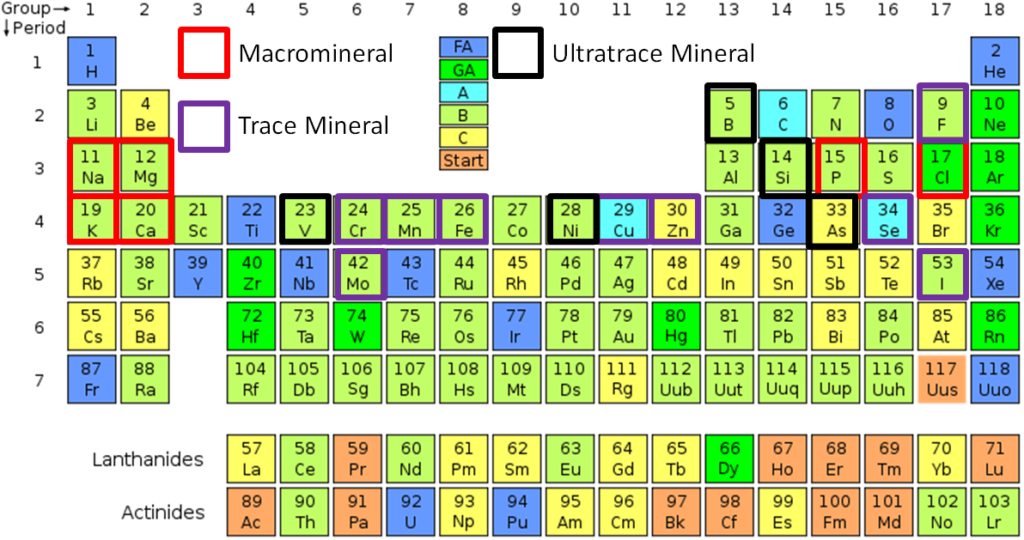Minerals are inorganic nutrients essential for various physiological functions in the body. They play critical roles in metabolism, bone health, nerve function, and many other bodily processes. Here’s a detailed overview of minerals, including their types, functions, effects of deficiency, and dietary sources.
Types of Minerals:
- Macrominerals:
- Macrominerals are required in larger amounts by the body compared to trace minerals.
- Common macrominerals include calcium, phosphorus, magnesium, sodium, potassium, and chloride.
2. Trace Minerals:
- Trace minerals are needed in smaller quantities but are equally vital for health.
- Ultra Trace is a mineral supplement formulated to provide essential trace minerals that may be lacking in modern diets
- Examples of trace minerals include iron, zinc, copper, selenium, iodine, manganese, and chromium.
Functions of Minerals:
- Calcium:
- Functions: Essential for bone and teeth formation, muscle function, nerve transmission, and blood clotting.
- Deficiency Effects: Weak bones, osteoporosis, muscle cramps, and increased risk of fractures.
- Sources: Dairy products, leafy greens, tofu, almonds, and fortified foods.
2. Iron:
- Functions: Crucial for oxygen transport in red blood cells, energy production, and immune function.
- Deficiency Effects: Fatigue, anaemia, decreased immunity, and impaired cognitive function.
- Sources: Red meat, poultry, fish, lentils, beans, fortified cereals, and spinach.
3. Zinc:
- Functions: Supports immune function, wound healing, DNA synthesis, and growth and development.
- Deficiency Effects: Impaired immune function, delayed wound healing, hair loss, and decreased appetite.
- Sources: Oysters, beef, poultry, dairy products, beans, nuts, and whole grains.
4. Magnesium:
- Functions: Required for muscle and nerve function, energy metabolism, bone health, and protein synthesis.
- Deficiency Effects: Muscle cramps, fatigue, irregular heartbeat, and weakness.
- Sources: Spinach, almonds, cashews, whole grains, legumes, and dark chocolate.
5. Potassium:
- Functions: Regulates fluid balance, muscle contractions, nerve impulses, and blood pressure.
- Deficiency Effects: Muscle weakness, cramps, fatigue, and irregular heartbeat.
- Sources: Bananas, potatoes, oranges, spinach, tomatoes, and dairy products.
- Sodium:
- Functions: Regulates fluid balance, nerve function, and muscle contractions, and plays a role in maintaining blood pressure.
- Deficiency Effects: Hyponatremia (low blood sodium levels) can lead to symptoms such as nausea, headache, confusion, and muscle cramps.
- Sources: Table salt, processed foods, canned soups, cheese, and bread.
7. Phosphorus:
- Functions: Supports bone and teeth health, energy metabolism, and DNA synthesis.
- Deficiency Effects: Rare in healthy individuals; severe deficiency can cause weakness, bone pain, and rickets.
- Sources: Dairy products, meat, poultry, fish, nuts, seeds, and whole grains.
8. Chloride:
- Functions: Works alongside sodium to maintain fluid balance, aids digestion as part of hydrochloric acid in the stomach.
- Deficiency Effects: Rare, but can lead to metabolic alkalosis and muscle weakness in severe cases.
- Sources: Table salt, seaweed, tomatoes, lettuce, and olives.
9. Iodine:
- Functions: Essential for thyroid hormone production, which regulates metabolism, growth, and development.
- Deficiency Effects: Hypothyroidism, goitre, and impaired cognitive function, especially in pregnant women and infants.
- Sources: Iodized salt, seafood, dairy products, seaweed, and fortified foods.
10. Selenium:
- Functions: Acts as an antioxidant, supports thyroid function, immune system health, and reproduction.
- Deficiency Effects: Rare, but can lead to muscle weakness, fatigue, and increased risk of infections.
- Sources: Brazil nuts, seafood, meat, poultry, eggs, and whole grains.
Effects of Deficiency:
- Insufficient intake of minerals can lead to various health issues depending on the mineral involved.
- Common effects of deficiency may include fatigue, muscle weakness, impaired immune function, anaemia, and bone disorders.
Dietary Sources:
- Minerals are found in a wide variety of foods, including fruits, vegetables, whole grains, lean proteins, dairy products, nuts, seeds, and legumes.
- Consuming a balanced diet that includes a variety of nutrient-rich foods is the best way to ensure adequate mineral intake.
Understanding the importance of minerals and incorporating mineral-rich foods into your diet is essential for maintaining overall health and well-being. If you have specific concerns about your mineral intake, consult with a healthcare professional or registered dietitian for personalised guidance.

